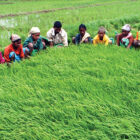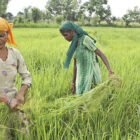The Indian farmer is in a bind; facing an unfolding nightmare with the fall of commodity prices in India and fertiliser selling at black market rates.
“Not by depending on financial allocations alone but by blood and by sweat we shall achieve…” said Prime Minister Pandit Jawahar Lal Nehru at the Bharat Krishak Samaj Fair in 1957. It is time for nostalgia as the Bharat Krishak Samaj (BKS) plans to celebrate its 60th anniversary in April 2015 and its archives throw up its proud and historic moments that are worth reliving.
At the inauguration of the BKS seminar on the “Role of farmer organisations in agricultural and community development in India”, Pandit Jawahar Lal Nehru referred to the targets set for the 2nd Five Year Plan. He described India’s ambitions and how it would achieve them. India would not do so by depending on financial allocations alone but “by blood and by sweat we shall achieve them”, he said.
In a perceptive speech he said: “Like a weighing scale, the progress in industrial and agriculture sectors had to be balanced for the achievement of an integrated economy. Industry alone could not deliver the goods”, the Prime Minister said, as he placed the country’s farm sector in perspective. Not only did farmers achieve those targets but India became a self-sufficient nation in agriculture production. Today, however, the balance is missing, the scales are tilted against farmers.
The Indian farmer is in a bind; facing an unfolding nightmare with the fall of commodity prices in India. Cotton, gram, basmati, maize, mustard and many other commodities are fetching less than a fourth of what the farmers were getting last year. Sugarcane farmers are not getting paid their dues. As if these were not enough, farmers have to purchase even fertilisers like urea and DAP in the black market for premia as high as 33 per cent over the maximum retail prices permitted by the government.
Those perpetuating such loot must not be allowed to get away. Indeed, it will not be possible for them to loot and scoot, as it were, without the nexus of the manufacturers and distributors. All this while the fertiliser industry is crying itself hoarse about being a victim of bad policy – which may well be correct – and no one is held answerable for these serious transgressions. The Fertiliser Association of India (FAI), representing mainly fertiliser manufacturers, distributors and importers, likes to categorise itself as a non-profit organisation. One is left to believe that fertiliser co-operatives are the only saving grace in this unholy mess.
The question is how does one navigate out of the mess and ensure that the new policy is not counterproductive. It is an oft-asked question and the answer is the same: involve farmers in policy making. Of course, the next question will be who will represent farmers at every level. One would have to leave the decision to the wisdom of the ruling alliance and hope that it does not err by selecting political appointees, especially property dealers or farmers, who reside in cities and those who advocate on behalf of vested interests.
The Prime Minister has given hope that things will change for the better. He has promised to implement the M. S. Swaminathan Committee Report that recommends that the procurement price of agricultural commodities be based on production cost + 50 per cent margin. The key word is ‘cost’ and one can hardly accept the cost as calculated by Commission for Agricultural Costs & Prices (CACP) or any such facile organisation.
It is time to act fast for farmers cannot live on hope alone. The budget for 2015 could be that defining moment. The good news is that the finance ministry has initiated the consultation process for collecting farmer views but past experience makes one sceptical. Subsidies are very important for farmer prosperity and also play a very important role in managing to keep the farmers’ at subsistence levels so that they do not migrate to cities in desperation. It has been suggested that this is precisely how farm subsidies keep the rural areas populated, cities governable and the nation from disintegrating.
Yet, in spite of the hue and cry by Indian economists and voices at the WTO, the subsidies that Indian farmers receive are not comparable to those in other countries like the USA, Europe or Japan. It is fashionable these days to compare India with China, to a glaring contrast. China directly subsidises cotton farmers by ₹2,800 a quintal over and above the ₹5,900 a quintal that they receive from the market, amounting to ₹8,700, a quintal. The Indian farmers are doomed to sell at less than the minimum support price; getting less than half the price that their Chinese counterparts get.
Pandit Nehru had said mere allocation of finance is not enough. Forecasting, designing subsidies and policies are more important than just allocating finance. It is far more complex than it appears. Is India prepared? No; it is not. Is the farmer worried? Yes he is.




